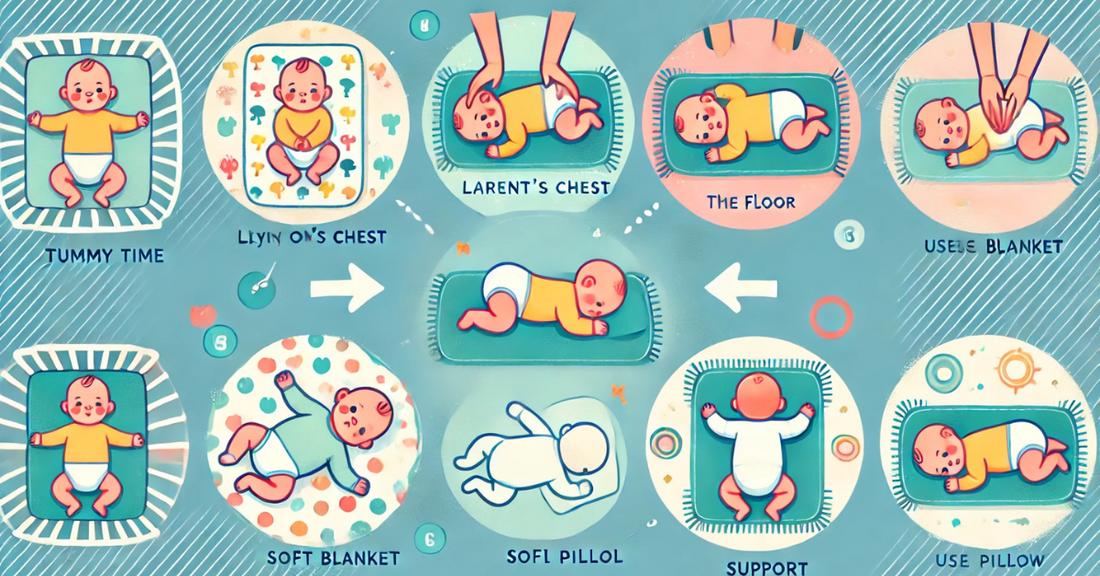Tummy time: When should baby start and why it is important

Tummy time is a crucial aspect of your baby's early development, but many new parents have questions about how to get started, its importance, and how to make it enjoyable for their little one. This comprehensive guide explores everything you need to know about tummy time to support your baby's growth and well-being.
What is Tummy Time?
Tummy time refers to the time your baby spends awake and supervised while lying on their stomach. Recommended by the American Academy of Pediatrics (AAP), tummy time helps strengthen your baby’s muscles and supports overall development.

Contrary to popular belief, tummy time doesn’t have to be restricted to the floor. You can also practice it on your chest, a play gym, an exercise ball, or even a blanket at the park. Just ensure the surface is firm, safe, and comfortable for your baby. Remember to supervise your baby closely and incorporate tummy time into their daily routine alongside other play positions, such as on their back or side.
Watch this beginner-friendly video for practical tummy time tips:
Why is Tummy Time Important?
Tummy time offers a wide range of benefits for your baby’s physical, sensory, and emotional development. Here are some of the most significant advantages:
1. Motor Development
- Strengthens neck, shoulder, and back muscles.
- Supports head control, a key milestone in early development.
- Prepares muscles for rolling, crawling, and eventually sitting up.
- Helps stretch the flexor muscles, which are naturally tight from the fetal position.
2. Sensory Stimulation
- Encourages proprioception (awareness of the body’s position in space).
- Develops the vestibular system, which is responsible for balance and movement.
3. Prevention of Flat Head Syndrome
Babies spend significant time on their backs during sleep to reduce the risk of sudden infant death syndrome (SIDS). However, prolonged time lying on the back can lead to plagiocephaly, or flat head syndrome. Tummy time counteracts this by providing opportunities for varied pressure on the skull.
4. Improved Digestion and Respiration
- Light pressure on the stomach during tummy time can aid digestion.
- Helps strengthen muscles involved in breathing.
5. Emotional Regulation
Engaging in tummy time with your baby can promote emotional bonding and help them regulate their emotions.
When Should Baby Start Tummy Time?

Specialists in child growth suggest initiating tummy time from birth for healthy, full-term infants. In the newborn phase, your baby might prefer tummy time on your chest or an incline surface. Once the umbilical cord stump falls off, you can begin practicing tummy time on a blanket or play gym mat on the floor.
Tips for Starting Early:
- Begin with sessions as short as 1 to 2 minutes.
- Slowly extend tummy time as your little one grows more at ease.
- Don’t worry if you didn’t start tummy time immediately after birth—it’s never too late to introduce it.
Why Does My Baby Hate Tummy Time?
It’s common for babies to dislike tummy time at first, as it requires effort and can be uncomfortable. Here are some strategies to make tummy time more enjoyable:
1. Create an Engaging Environment
- Use colorful toys, mirrors, or high-contrast objects to capture your baby’s attention.
- Place yourself at eye level to maintain engagement.
2. Adjust the Position
- Prop your baby’s chest on a rolled-up towel or nursing pillow to make the position more comfortable.
- Try tummy time on an exercise ball, rolling gently to add movement.
3. Keep Sessions Short and Frequent
Short sessions (1-5 minutes) multiple times a day are more effective than one long session.
4. Incorporate Fun Activities
-
Play airplane by holding your baby on your shins while you’re lying on your back.
-
Encourage interaction with funny faces, songs, or sounds.
Need more ideas?
Tummy Time Milestones by Age
Tracking your baby’s progress can help you understand how tummy time supports their development.
Explore age-specific tips and activities in this detailed guide.
When Should Baby Stop Tummy Time?
Tummy time is most beneficial during your baby’s early months. However, it becomes less critical once your baby achieves certain milestones:

Skills That Indicate Readiness to Graduate:
- Pushing up on hands and lifting the chest off the ground.
- Turning their head in both directions while pushing up.
- Pressing down with open palms, strengthening finger muscles.
If your baby is rolling out of tummy time frequently, it may be a sign they’re ready to transition to other forms of play and exploration.
Expert Tips for Tummy Time Success
Rachel Coley, Pediatric OT:
"The earlier you begin positioning your newborn on their stomach, the more beneficial it is. Reflexes in newborns make tummy time feel natural, and babies who start early tend to enjoy it more as they grow.”
Maral Amani, Pediatric PT:
“Instead of focusing on completing 45 minutes at once, try shorter, more frequent sessions throughout the day. Aim for one to five minutes, five to seven times daily.”
Frequently Asked Questions About Tummy Time
1. How Much Tummy Time Does My Baby Need?
For newborns, aim for a few minutes per session, gradually increasing to about 15-30 minutes per day by 3 months old and up to an hour by 6 months.
2. Can Tummy Time Replace Other Types of Play?
No, tummy time complements other activities like back play and side-lying. Each position offers unique benefits.
3. Is Tummy Time Safe for All Babies?
Always consult your pediatrician if your baby has specific medical conditions. Supervision and a safe environment are essential.
Tummy time is more than just a developmental milestone—it’s a bonding opportunity and a stepping stone for your baby’s growth. By starting early, making it fun, and staying consistent, you’re setting the stage for a lifetime of healthy development. Ready to get started? Lay down a blanket, gather some toys, and enjoy this precious time with your little one.







0 comments